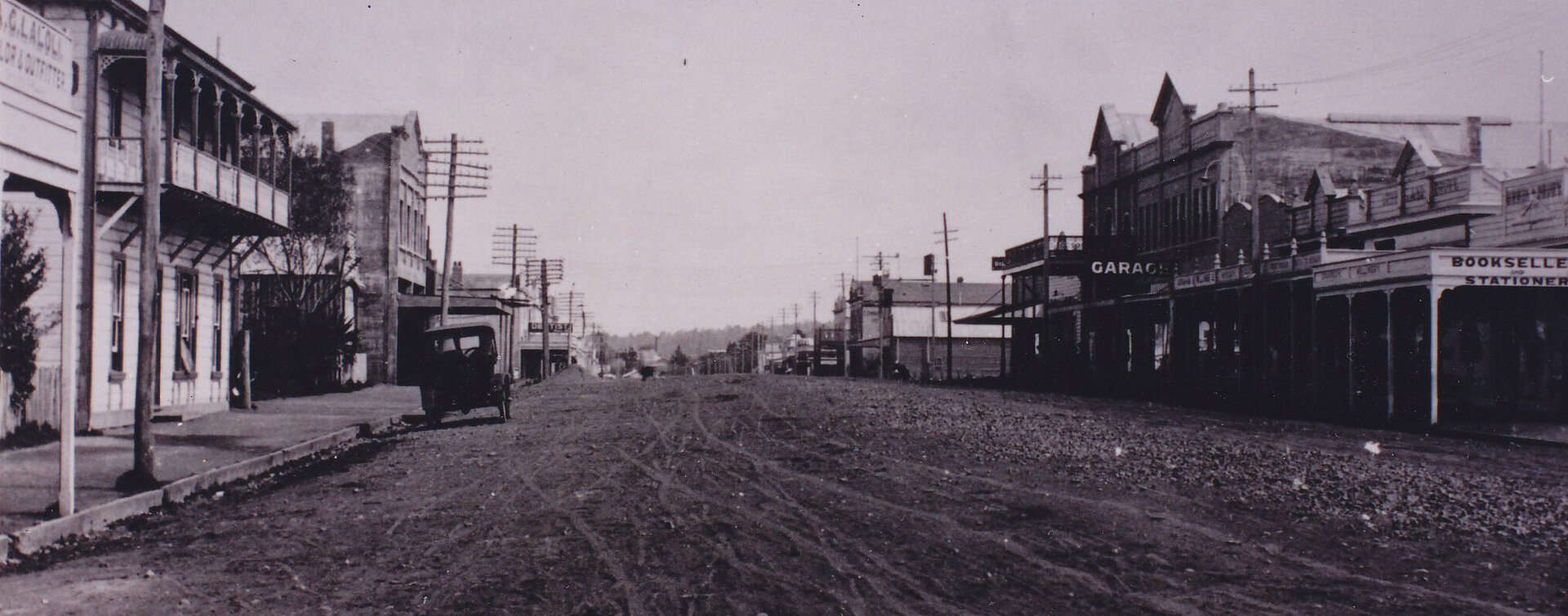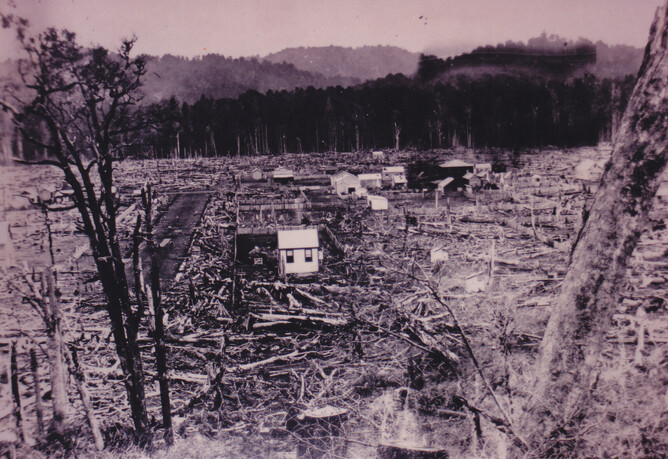THE RAETIHI BUSH FIRE : March 1918
It was March 1918 and in France, World War I was reaching its climax of slaughter. In New Zealand, the Government meteorologist, D. C. Bates, in his weather station in Wellington was carefully charting the progress of something he feared might also be destructive in a different way. A cyclonic storm was passing Norfolk Island, north-east of Australia, and travelling south-east. Soon it must strike New Zealand. The winds would be violent enough to threaten ships and buildings, and torrential rain would follow.
By the time of World War I, the central North Island area which surrounds 9,000-ft. Mount Ruapehu was gradually being opened up as communications improved. In the 1880s a coach road to join Pipiriki and Tokaanu had been cut through the solid bush which covered most of the area, a road that gave birth to the little town of Raetihi. In 1908 the first train ran between Wellington and Auckland. The line skirted the foot of Ruapehu, putting Ohakune and Raetihi well on the map.
Ohakune grew more rapidly and by 1918 had a population of 1,300; Raetihi still had less than half that number. "The principal buildings of Raetihi", a newspaper reported at the time, "include two large accommodation houses, several stores, a Bank, a Post Office, County Council offices, several places of worship, a Maori pa and one or two dairy factories. It has the benefit of the best farming country of the central Main Trunk Railway within its reach."
The dairy farmers, who for some years had been increasing their acreage by clearing the bush, had suffered months of drought. The grass was brown and the bush like tinder. All the better, they said, for burning, and this was the usual time of year to do it. The drier it was, the more thorough the destruction and the easier the ground was to clear afterwards. So, on March 18 matches were struck and fire put to the tinder. The fires were burning nicely when the cyclone struck.
Yellow Pall
A strange sight met Wellington people when they awoke on the morning of March 19. A newspaper described it: "Never probably in the history of Wellington has a morning dawned under such weird and uncanny conditions as did yesterday. In the early hours many a person twisted uneasily in his bed. The air was heavy and oppressive, and the morning light was clouded and flickered strangely. Glancing outside, early risers saw a strange and almost unearthly sight. A weirdly yellow pall hung over everything, creating a ghostly atmosphere that shrouded the dawn." The sky was at times almost blood-red and its reflection a ruddy golden hue. The air was heavy and warm. A sense of mystery brooded over the hazy atmosphere. The wind seemed to rise and die in a breath, sometimes moving quickly like the hot blast of air from a furnace, and again dying away in an uncanny manner." This was about 6 o'clock. An hour later and many people were astir witnessing with awe the unusual spectacle. The yellow haze was not so thick, but the air still came in strange, warm waves and brought with it a pronounced smell of burning. Some said they smelt sulphur. In the suburbs people were certain that the city was burning and rang frantically to ascertain whether the town proper was still in existence."
The telephone in the Weather Office rang almost continuously. The queries were anxious. Was it a freak storm? The Aurora Australis? A huge eruption like Krakatoa? Or was it, some frightened people asked seriously, the end of the world?
Meanwhile, the newspapers were setting up their headlines with what meagre information they could obtain: "Strong Gale at Napier", "High Seas Cause Destruction on the Canterbury Coast", "Damage at Lyttelton'', "Palmerstonian’s Scared", "Wanganui's Water Supply in Danger". Nowhere was there an explanation of the uncanny dark sky.
The following day fires were mentioned: "Fierce Gale Sweeps over the Dominion'', "Serious Bush Fires in the North Island", "Township Swept Away", "Train and Telegraph Services Interrupted", "Smoke Fog at Sea", "The Town of Raetihi Reported Destroyed".
Raging Fires
One newspaper reported under a Taihape dateline of March 19: "Cyclonic windstorms have been raging since yesterday throughout the Main Trunk district and smouldering fires have been fanned into violent action. Raetihi and Ohakune are surrounded by raging fires and are suffering severely, but, as communication is broken, it is impossible to give definite details. Most of Raetihi is gone except the Railway Station. A railway bridge between Ohakune and Horopito is on fire and the Auckland Express is unable to get through. South of Taihape, fires are raging over the whole countryside. Traffic is impossible between Ohotu and Mangaweka and mails cannot get through by road. There is no telephonic communication from Taihape northwards further than Hihitahi.
The following additional telegram has been received from the Post-master at Taihape: 12.51 p.m. “It is impossible to give the nearest points of the fires. They are raging in all directions. I have lost all stations north of Turangarere, on the Waimarino plains. I think we will have connection with Ohakune this evening. The railway can get him on their tablet wire."
The wind had risen when the people of Raetihi, dressed in Sunday clothes, crowded churches to celebrate Harvest Festival in the evening. Everyone remarked on the strength of the wind which had increased in violence during the services. It was so strong that many found difficulty walking against it.
In the distance they could see fires lighting the sky but were not unduly worried-the wind was not in their direction. Many went unconcerned to bed; others, uneasy, decided to stay up.
Suddenly the wind changed. Now it was blowing the fires straight towards the town and already the smell of smoke filled the air.
Before long, calls for help were coming from farms in the path of the fires. The local policeman, Constable Moss, away on some business in the back blocks, decided to return at once. His horse, one of the finest in the district, was unable to match the speed at which the fires were travelling, tree-top after tree-top exploding into flame before the trunks had caught. Moss arrived to find his police station burnt down, his wife and children missing and fires raging all-round the town. The smoke was so dense that people had to crawl on hands and knees and could recognise Main Street only by the feel of gravel in their hands.
The Raetihi fire engine had gone out earlier to a farm in response to one of the first calls. At the farm, the firemen could find no water and already the fire was all around, with trees on each side of the road burning. Two or three car owners had also gone out to the rescue, and one car burst into flames. The fire engine had to be abandoned.
Hard to Breathe
The smoke was blinding and choking, and people and animals found it hard to breathe. Some of the few animals that survived were coughing for months after the fire.
Ohakune was threatened, but the station master, realising the disaster that threatened Raetihi, managed to send an engine with some rolling stock through to rescue refugees. It stood in the Raetihi station with the whistle blowing almost continuously to let the people know it was there. But at the same time another steam whistle had begun to sound continuously in a sawmill some four miles out of town. Captain Griffin of the Salvation Army and a band of volunteers set off to discover if it was a call for rescue, only to find the mill was deserted and the team whistle jammed.
In Raetihi the fire gained ground steadily. Most inhabitants had made their way to the safety of the railway station, but a few, including the vicar and Captain Griffin, stayed to try and save the town.
They quickly saw that the crucial point was one of the accommodation houses. If that went, the rest of the town could not be saved, and already the fire was catching in a huge pile of maire-wood stacked against one wall of the building. In the house were several young men who had been working in the bush. Instead of helping, they made off to the station leaving all the windows open-the worst possible action. Now the only chance of saving it was to shut the windows. A ladder was put to an upper window and Captain Griffin put his foot to the first rung and collapsed. His place was taken by Mr Keuck and his wife, who both went up the ladder and into the house. They managed to shut the windows and the house was saved. Elsewhere people were standing in streams or in water tanks while their houses burnt nearby. Families became separated; wives from husbands, children from parents, as they moved painfully towards what seemed to many the only hope, the train. Mrs Keuck later recalled: "Oh, yes, there were heartrending scenes that night, especially at Ohakune where the relief train landed many refugees. As for us, once we had saved the boarding-house, we decided to stay. There was fire all around, but our bit of the town had been left like a little island. Many people came to our place to shelter. One woman nearly drove us frantic by crying and shrieking all night.
"In the morning - well, we scarcely knew it was morning because it was still quite dark from the smoke - someone came in and said, 'Well, the worst is over.' Just then the alarm went again. The picture theatre was on fire. How we longed for a cup of tea. The water was undrinkable. Full of smoke and ash. Then at last someone found some in a well.
Later some bread and meat arrived from Taihape. The baker at Taihape, helped by our Member of Parliament, Mr Smith, had been up all night specially baking bread for Raetihi. It was brought by train and then by trap. Clothes and other things were sent later. Mrs Massey, wife of the Prime Minister, had made an Appeal. Of course, all sorts of things came. People just emptied out their rag-bags for us. One of the first things I unpacked was a pair of high-heeled white satin wedding shoes.
Animals Burnt
One of the most horrible sounds in the roar of wind and flames had been cries from animals and many were lost at Raetihi, caught in the fire and burnt alive.
When morning came, the fire had passed by. As the few remaining people - including those who had saved the boarding house and thereby their own few homes - looked around at the destruction and the smouldering ruins, they heard a wonderful sound: rain. Soon it was falling in torrents.
Three people lost their lives at Raetihi, and nearly all had lost their property. Fifty-eight houses were destroyed, nine sawmills in the surrounding area, and several farms.
Some who had fled never returned, but most gradually drifted back to blackened Raetihi to begin the huge task of clearing, rebuilding and sowing. The Government had to send enormous quantities of grass seed to re-establish pasture.
But nature had not quite finished with the town. Even while many of the stricken inhabitants were still living in tents, sheds and other make-shift shelters, they had to endure some of the worst snowstorms and one of the harshest winters on record.






